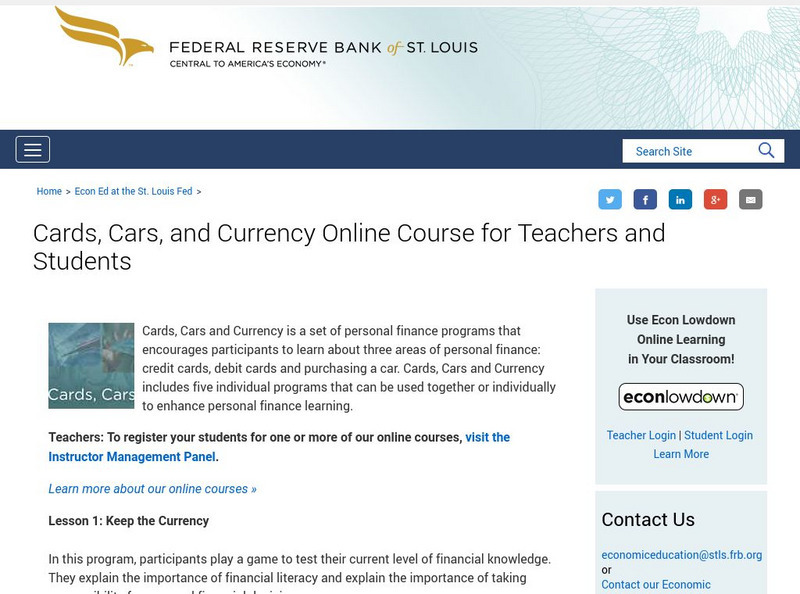Federal Reserve Bank
Federal Reserve Bank of St. Louis: Cards, Cars, and Currency
A unit on personal finance related to debit cards, credit cards, and purchasing a car designed to help students develop financial responsibility.
Federal Trade Commission
Federal Trade Commission: Credit and Your Consumer Rights
Advice for students about how to correct errors in bills or their credit reports, and how to manage debt payments.
Consumer Financial Protection Bureau
Consumer Financial Protection Bureau: Playing a Credit and Debit Game
Students play a game to practice and explore positive credit and debit card behaviors.
Save And Invest
Finra Investor Education Foundation: Debt Elimination
This lesson plan offers different strategies for eliminating debt and strengthening one's financial position and cash flow.
Next Gen Personal Finance
Next Gen Personal Finance: Types of Credit
Lessons and activities to teach students about types of credit.
Next Gen Personal Finance
Next Gen Personal Finance: Managing Credit
Lessons and activities to teach students about managing credit.
Federal Reserve Bank
Federal Reserve Bank of Philadelphia: Let's Get Financially Focused! [Pdf]
Should I use credit? This lesson plan provides some insight into why or when it is good to use credit, versus why or when it is not.
University of Missouri
University of Missouri: Wise Pockets: Four Dollars and Fifty Cents
This is a lesson geared towards elementary level students. Using the book Four Dollars and Fifty Cents by Eric Kimmel, the teacher instructs students about the terms creditor, debtor, collateral, credit, and credit report. Lesson...
PBS
Pbs Lesson Plan (Affluenza): Credit Quandaries
"Credit cards are not free money." Just how do credit cards work? This site provides a lesson in which students investigate the lure of credit card companies, the pitfalls of credit debt, and the impact of credit debt on our society....
Other
Economic Awareness Council: Credit Control [Pdf]
Learn about responsible use of credit and credit cards, your credit score and why it is important, and how to get out of debt if you've already overextended your finances.
Goodwill
Gcf Global: Financial Problem Solving Strategies
Learn these financial strategies to help reach your goals.
Consumer Financial Protection Bureau
Consumer Financial Protection Bureau: Avoiding Debt
Learners read a short story and a handout to learn about excessive debt and ways to avoid or reduce debt.
Alabama Learning Exchange
Alex: Charge It?
In this lesson plan, young scholars will select appropriate and inappropriate uses of credit cards by role-playing a college student who must choose to either use cash or a credit card to pay for a variety of real-life scenarios. This...
Federal Trade Commission
Federal Trade Commission: Managing Debt
Debt is the money you owe someone and its not always bad. Learn what it is, how to get out of it, and where to start.
Other
Debt
Provides online information about personal finances covering topics such as college years, weddings, building a family, buying and selling a home, and retirement. Learn about debt relief services and use the handy tools to help you...
Federal Trade Commission
Federal Trade Commission: Consumer: Your Credit History
Your credit history is important if you want to get a loan, a job, an apartment, or a credit card. Learn how to get credit and what goes into a credit report. Be sure to check your report often to make sure the information is correct.




![Federal Reserve Bank of Philadelphia: Let's Get Financially Focused! [Pdf] Lesson Plan Federal Reserve Bank of Philadelphia: Let's Get Financially Focused! [Pdf] Lesson Plan](http://content.lessonplanet.com/resources/thumbnails/409974/large/bwluav9tywdpy2symdiwmduymc0xmdm5my0xyw8xoxbvlmpwzw.jpg?1589982798)


